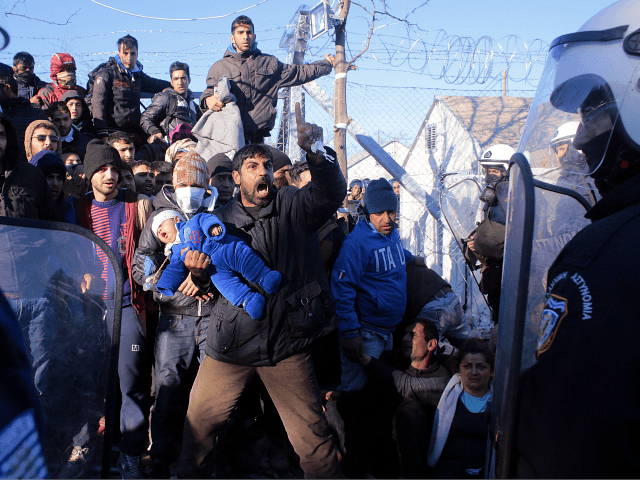Luxembourg’s progressive cardinal Jean-Claude Hollerich echoed a Christmas appeal for migrants by Pope Francis, decrying the exploitation of migrants in Greece and the shameful inaction of Europeans to help.
Speaking at the cathedral in Luxembourg City, Cardinal Hollerich chastised his fellow Europeans for not coming to the aid of those living in refugee camps on the Greek island of Lesbos, which he personally visited last May at the pope’s behest.
“There are definitely children there that will vanish and be forced into child prostitution,” said the Jesuit cardinal, who is the president of the Commission of the Bishops’ Conferences of the European Union (COMECE). “There are children there who will be taught to steal. Others will be raped and assaulted. This is gruesome.”
“This is not happening far from Luxembourg in some place where we cannot help,” he continued. “This is happening in Greece — in Europe and in the European Union. We must be fiercely ashamed that we have not done anything to help.”
Earlier this week, the cardinal expressed his opinion that the political inaction on the Mediterranean refugee crisis is due to “fear of right-wing parties.”
“I find it outrageous that we’re letting people drown in the Mediterranean; that our hearts have become so hard; that politics no longer dares to act for fear of right-wing parties,” Hollerich told RTL Radio.
In his Christmas diatribe on behalf of migrants, the cardinal brought in another topic dear to the pontiff’s heart — climate change — suggesting that many of those migrating are being forced out of their countries by global warming.
The first to suffer the effects of climate change are the less fortunate people in third-world countries, the cardinal said, namely, those fleeing for Europe.
In the age of global warming, Hollerich declared, there is a new form of migrants who are no longer “economic refugees” but “climate refugees,” escaping the effects of extreme weather.
A vocal ecological activist, the cardinal said this past fall that climate change was the most important issue faced by the Vatican synod on the Amazon, urging that its final document “be very strong” on ecological issues.
“If our planet is destroyed, we can shout as much as we want about married priests or women priests, but there will be no priests needed anymore,” Hollerich said in an interview with the Jesuit-run America magazine.
“So, it’s the most important problem and it’s a problem with the greatest urgency,” the cardinal said.
Hollerich stressed the need for “ecological conversion” on the part of everyone, declaring that he buys fair-trade coffee instead of Nespresso, no longer uses plastic bottles, and has swapped out his diesel car for a hybrid one.
“We bishops have to change our lifestyle, and if we older people succeed in doing it, then the younger ones can do it too,” he said. “But if I cannot change my own lifestyle, how can I say to young people to do so?”
In late 2018, Hollerich signed an appeal calling on government leaders to take immediate action to overcome the “devastating effects of the climate crisis.”
The appeal called for keeping global warming below 1.5º C as well as a shift toward sustainable lifestyles, respect for indigenous communities, and the implementation of a “financial paradigm shift” in line with global climate accords.
This paradigm shift entails “putting an end to the fossil fuel era and transitioning to renewable energy” as well as rethinking the agriculture sector to ensure it provides healthy and accessible food for everyone, with a special emphasis on promoting agroecology, it said.
Following last May’s European elections, Hollerich said he was delighted with the successes of green parties while lamenting the rise of populist-nationalist groups.
“It is positive that in several places numerous young people voted for ecological parties, which means that the themes of environment and creation can become important in the future,” Hollerich said, noting that “as a Church” the victory of the green parties “makes us happy.”
Populist victories, on the other hand, would have been even “worse” if not for the pope’s constant call for a more welcoming attitude toward migrants, Hollerich said at the time.
In his own Christmas blessing this week, Pope Francis underscored the plight of migrants, addressing the topic of immigration a remarkable three times in an 865-word message.
“May the newborn Lord bring light to the people of Africa, where persistent social and political situations often force individuals to migrate, depriving them of a home and family,” the pontiff said to the estimated 55,000 pilgrims and tourists gathered in Saint Peter’s Square.
Modern migration is the product of injustice, the pope stated, insisting that migrants often find their efforts impeded by “walls of indifference.”
May the Son of God protect and sustain all those who, due to injustices “are forced to emigrate in the hope of a secure life,” the pontiff said in his Urbi et Orbi blessing.

COMMENTS
Please let us know if you're having issues with commenting.